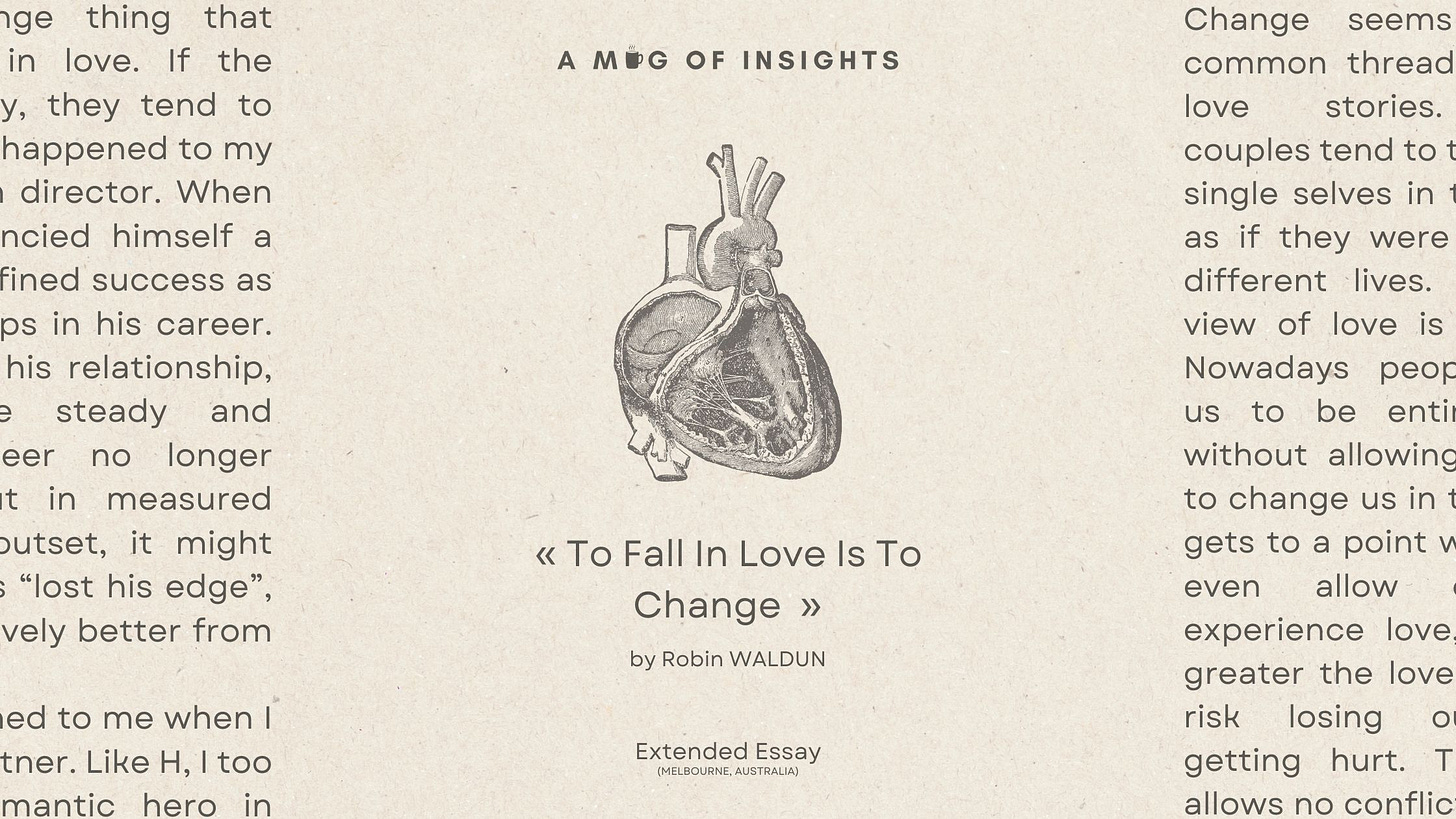To Fall In Love Is To Change, There's No Way Around It
How to love in a world that's afraid to feel
This is another post for paid subscribers. Paid members will get access to the full archive and all of my extended essays with further reading lists. And on average, subscribers will get 50% more posts from our regularly scheduled program. This will give me more time (alongside grad school research) to produce high-quality posts consistently. Thank you for your contribution!
I noticed this strange thing that happens to people in love. If the relationship is healthy, they tend to “chill out” a little. This happened to my friend H. When he was single, he fancied himself a romantic hero and defined success as pulling bombastic leaps in his career. But after a year into his relationship, his output became steady and considered. His career no longer moves in spikes but in measured quarters. From the outset, it might seem like this guy has “lost his edge”, but his work is objectively better from a tempered place.
A similar thing happened to me when I fell in love with my partner. Like H, I too fancied myself a romantic hero in letters. I lived and breathed my identity as a writer and scholar. But when she entered my life, it was as if my feet had landed on solid ground. I started making healthier choices and found joy in cooking, appreciating a morning coffee and taking life slowly. During the first few months of our relationship, I also felt like I had “lost my edge”. But in reality, I was only letting go of my neurotic self.
Change seems to be the common thread in these two love stories. Successful couples tend to talk about their single selves in the past tense as if they were living entirely different lives. However, this view of love is under attack. Nowadays people encourage us to be entirely ourselves without allowing our partners to change us in the slightest. It gets to a point where we don’t even allow ourselves to experience love, because the greater the love, the more we risk losing ourselves and getting hurt. The ideal love allows no conflicts, no pain and no space for changing ourselves.
But my contention here is that love is supposed to change us, though we like to pretend it doesn’t. In this post, I’d like to collect some of my recent thoughts on the topic of love and why it necessarily involves growing pains.
1: Love requires attachment
In Alain Badiou’s book In Praise of Love, he quoted a slogan from a dating site:
“Get perfect love without suffering!” (6)1.
And if we take a closer look, this is essentially what online dating is all about. For the online dater, love is not supposed to cause any pain. It’s viewed as an add-on to an already solid self that is built on brief bios, hobbies and political leanings. It’s a safe bet to sell ourselves as narratives. We’re not really putting ourselves on the line to be vulnerable, attached let alone drastically change ourselves in the name of love.
Byung-Chul Han called this a palliative zone in love where a relationship is reduced to a “mechanical and spatial side-by-side (31)”. We view the Other in online dating more like an accessory to reaffirm our identities. As a consequence:
“The other as pain disappears. Love as consumption, which reifies the other into a sex object, does not hurt (31)2.”
But in reality, pain and desire create true love. Even the most painful heartbreaks can trigger a retrospective fondness. “You know, misery is wasted on the miserable,” Dr. Bigelow told Louie in the TV sitcom Louie, “THIS is love. Missing her, because she's gone. Wanting to die.... You're so lucky. You're like a walking poem… The bad part is when you forget her when you don’t care about her, when you don’t care about anything… What I would give to have that feeling of [heartbreak] again.”
In short, pain is attachment. It requires courage to entertain the possibility that love has serious consequences and could hurt us deeply. But this courage is also the foundation of Eros. It gives us life and passion. And where a human being can suffer the pain of love, there he is really present – there, whether he is aware of it or not, he has also loved (31).
2: Love opens up a whole new world.
The pain of love rewards us by opening up new possibilities. In Badiou’s view, love is a “Two scene,” a theatre meant for a duo. It makes the world arise anew from the vantage point of the Other, or Difference (44)3.
Keep reading with a 7-day free trial
Subscribe to A Mug of Insights to keep reading this post and get 7 days of free access to the full post archives.





